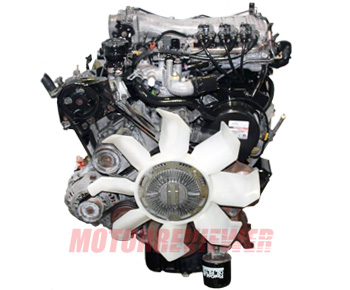Mitsubishi 6G72 3.0L Engine Specs, Problems & Reliability

The Mitsubishi 6G72 is a 3.0-liter V-shaped six-cylinder gas engine that was produced by the Japanese carmaker at the Kyoto plant from 1986 to 2018. This 3.0-liter engine was introduced to the public together with the two-liter 6G71. A few years later, the 2.5-liter 6G73, 3.5-liter 6G74, and 3.8-6G75 versions were created on its basis and put into production as well. The 6G72 engine was used on a large number of Mitsubishi, Dodge, and Chrysler vehicles. Such popular in the world Japanese SUV models as the Mitsubishi Pajero Sport (Montero Sport/Challenger) and Mitsubishi Pajero (Montero/Shogun) at some point also had this 3.0l V6 engine. It's also worth mentioning a very wild twin-turbo version, the 6G72TT, which was made for sport cars like the Mitsubishi 3000GT/GTO and the Mitsubishi Eclipse. Let's dive into the design of the 6G72 engine, it's most common problems, and reliability.
Mitsubishi 6G72 Overview
The 3.0-liter 6G72 engine was built around a cast iron V-shaped cylinder block with a 60-degree camber angle between the cylinder banks. Depending on the production year and version of the engine, single-cam SOHC aluminum heads with two or four valves per cylinder (SOHC 12v or 24v), as well as twin-cam DOHC heads with four valves per cylinder (DOHC 24v), can be installed on top of the block.
The camshafts are driven by a timing belt. Some versions of the 6G72 are equipped with a Mitsubishi MIVEC variable valve timing system, but only on the intake side. All versions of the 6G72 engine came with hydraulic valve lash adjusters; therefore, there is no need for manual adjustment. Basically, almost every 6G72 engine was produced with a conventional multipoint fuel injection MPI, but a version with GDI direct fuel injection also came out of the factory. Engines with the GDI system have an increased compression ratio of up to 11, a high-pressure fuel injection pump, and unique cylinder heads equipped with piezo injectors that send fuel directly into the combustion chambers (this is why they are called direct injected). The 6G72 GDI is relatively rare and can be found on cars intended for the Japanese domestic market (or JDM) only.
The 6G72 engine remained in production for a very long time, but during the 2010s it gradually gave way to the 3.5 6G74 engine, and by the 2020s Mitsubishi made a complete switch to a new, all-aluminum 3.0-liter V6 engine called the 6B31.
Twin-turbo 6G72TT GTO/3000GT Engine
The 3.0-liter Mitsubishi 6G72TT engine is a very rare and unique modification with two turbines. This turbocharged V6 was equipped with two MHI TD04-09B turbochargers (or TD04-13G in European specification) and two air-to-air intercoolers. The maximum boost pressure is 0.5 bar. The turbocharged version differed from the naturally aspirated version, the 6G72, by having a lower compression ratio of 8:1, special camshafts, and stronger forged pistons. It was also equipped with an oil cooler, and the cylinder block had oil squirters (piston cooling jets) that spray oil onto the underside of pistons to help remove heat. The standard 6G72TT engine developed 280/286 hp and 300/306 lb ft (407/415 Nm), and the most powerful version for the Mitsubishi GTO/3000GT VR-4 produced 324 hp at a boost pressure of 0.8 bar and 315 lb ft (427 Nm) of torque.
Engine Specs
Direct fuel injection
10:1
11:1
8.0:1 - 6G72TT
6G72 Engine Problems and Reliability
The 6G72 engine rarely has problems, it breaks down mainly due to small things, there are practically no weak points in the design, and it is considered one of the most reliable and unpretentious Mitsubishi engines. This engine is capable of consuming even low-quality fuel and is not very demanding on engine oil. Of course, even the most reliable motor has its drawbacks, and the 6G72 has them too.
Unfortunately, if the timing belt breaks, the engine is guaranteed to bend the valves. The timing belt itself has really good quality and lasts even more than 60,000 miles (90,000 km), but only if it is not exposed to engine oil (for example, due to a leaking front cover gasket). There are a lot of complaints about unreliable hydraulic compensators (lash adjusters). On average, they need to be replaced every 60,000 miles (90,000 km). Another disadvantage is the difficulty of replacing spark plugs. To change the spark plugs, you need to remove the intake manifold, since there is no direct access to them.
As the mileage increases and the engine ages, typical breakdowns of a tired engine may appear. As a rule, at a mileage of 200,000 or more, the engine begins to consume noticeable amounts of oil. This happens due to wear of the piston rings and hardened valve stem seals. With high mileage, cooling system pipes, oil seals, and gaskets start to leak, and electrical problems arise (issues with high-voltage wires, sensors, ignition coils, etc.).
Mitsubishi 6G72 V6 3.0L Reliability Summary
So, is the 6G72 3.0 a reliable engine? As life has shown, despite the fact that 3.0-liter Mitsubishi engines still have some drawbacks, the 6G72 is a robust and reliable engine. The downside of this engine is its low power and high fuel consumption by modern standards, but you still have to pay something for reliability and maintainability. All engines break down at some point, as nothing lasts forever. To extend the life of your engine, it is recommended to maintain it on time, fill it with high-quality and recommended motor oil, and refuel the car with premium gas. With proper care, the 6G72 3.0 V6 Mitsubishi engine is guaranteed to last more than 250,000 miles.
